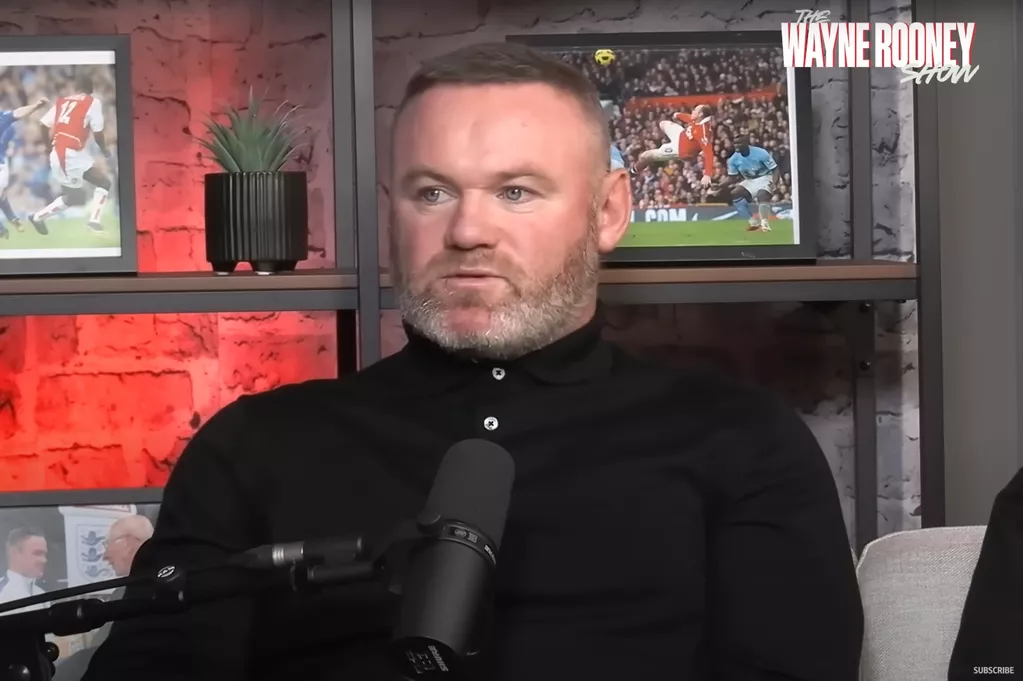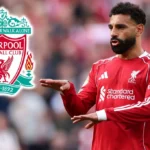Wayne Rooney questions Mohamed Salah’s ‘work ethic’ and makes Trent Alexander-Arnold point

Liverpool’s season has taken a strange and worrying turn, and the name on everyone’s lips right now is Mohamed Salah. Once the symbol of confidence, pride, and power at Anfield, the Egyptian superstar now finds himself under fire from one of England’s biggest football legends — Wayne Rooney.
It’s not often that Salah faces such public criticism. For years, he has been Liverpool’s talisman, the man who made defenders panic and fans rise to their feet. But this season, something feels different. The spark that once made him unstoppable seems dimmed, and the goals that used to come so easily have suddenly dried up.
Liverpool’s defeat to Chelsea at Stamford Bridge last weekend was the final straw for many fans and pundits. It wasn’t just about losing 2-1 — it was the manner of the performance. The Reds looked disconnected, their attack toothless, their defence fragile. And Salah, usually the man who lifts the team in moments of struggle, looked… lost.
That word — “lost” — came from Rooney himself.
Speaking on *The Wayne Rooney Show*, the former Manchester United and Everton legend did not hold back. His tone was sharp, his words heavy. He said Salah looked like a player unsure of his role, unsure of his team, and unsure of himself. For a footballer who built his reputation on confidence, those words hit deep.
“I think Trent is a big loss,” Rooney began, referring to Liverpool’s injured right-back, Trent Alexander-Arnold. “There was always debate about whether he was the best defender or not. But some of the passes he played through to Salah — those switches of play, those clever balls — that’s a big loss for Liverpool.”
Rooney’s point struck a nerve with Liverpool supporters. For years, the chemistry between Trent and Salah has been one of the most dangerous partnerships in football. Trent’s long diagonal passes found Salah in stride almost every time. The understanding between the two was so natural that many teams built defensive plans just to stop that connection
Without Trent, Salah looks isolated. He drifts inside more often now, searching for the ball, looking frustrated. The Egyptian’s usual freedom on the right wing has been replaced by confusion. Arne Slot’s tactical system — more controlled and position-based than Jurgen Klopp’s high-speed chaos — demands structure. But for players like Salah, who thrive on freedom and instinct, it can feel restrictive.
Rooney continued his analysis with a tone of concern and criticism mixed together. “When you look at Salah this season,” he said, “he’s not been himself. He’s one of the best players in the league, no doubt. But I think over the last week, I’d question his work ethic. When things are going well, and you’re scoring goals, everyone overlooks it. But now that Liverpool are struggling, it shows. I think he’s looked lost.”
Those words — “question his work ethic” — echoed loudly. Coming from a player like Rooney, known for his own relentless energy on the pitch, the comment carried weight.
Salah’s stats this season back up the criticism. The Egyptian has scored only two goals in the Premier League, with just one coming from open play — and that was on the opening day against Bournemouth. Since then, his shooting looks hesitant, his runs mistimed, and his body language uncertain. He hasn’t scored in his last three league games, and that’s rare for a man who usually finds the net almost every week.
Even more worrying, fans have noticed Salah’s reduced defensive effort. Against Chelsea, he was often seen standing still when Liverpool lost possession, his full-back struggling without help. In past seasons, Salah’s pressing intensity and tracking back were underrated aspects of his game. Now, those moments of hard work seem to have faded.
Some inside Anfield whisper that Salah’s struggles may not only be tactical — they might be emotional too. With Trent Alexander-Arnold injured, Salah has lost his natural partner on the pitch. The two understood each other without speaking, their chemistry built over years of training and success. Without Trent, Salah’s supply line is cut off. He receives fewer accurate passes in dangerous positions, forcing him to drop deeper to get involved.
Rooney highlighted that loss directly. “Trent gave Salah those moments,” he said. “Those quick switches, those passes behind defenders. Without him, Salah’s isolated. That’s a big issue in this new system.”
But the former England captain didn’t stop there. He also hinted that Liverpool’s transfer business this summer might have unsettled Salah mentally. “Look at the players coming in — Isak, Ekitike, Wirtz,” Rooney said. “They’ve spent big money on attacking players. What does Salah think now?”
The question is a powerful one. For years, Salah has been Liverpool’s undisputed star, the main man. But football changes fast. Every transfer window brings new faces, new competition, and new expectations. When a club spends huge sums on young forwards, it can make even legends wonder about their place in the team.
Salah’s new contract last summer made him one of the highest-paid players in the Premier League. It was a reward for years of service and brilliance, but it also came with pressure — the expectation to deliver consistently, no matter the circumstances. And now, when he’s struggling, those numbers become a target for critics.
Arne Slot’s system, while modern and tactical, has not yet brought the best out of Salah. Unlike Klopp’s high-tempo style, Slot prefers structured build-up, where players maintain fixed positions. Salah’s freedom to roam inside or switch flanks has been reduced. He’s often seen waiting for the ball rather than driving forward to create chances himself.
Many Liverpool fans are beginning to ask whether Slot’s tactical plan suits Salah’s strengths. The Egyptian has always been at his best when given space to attack defenders, using his speed and sharpness to break through. In the new system, those spaces seem smaller, the passes slower, and the chances fewer.
For Rooney, it all ties back to one thing — mentality. “Top players have an ego,” he said. “Salah has been at the top for a long time, but when the team starts struggling, that’s when you see who’s willing to do the dirty work. That’s what I question right now.”
The remark has divided the football world. Some pundits agree with Rooney, saying Salah needs to do more off the ball. Others believe the problem lies with Slot’s tactics and the lack of creativity from midfield. Still, one thing is clear: Salah’s form has become the biggest concern for Liverpool fans this season.
Inside the club, the mood remains calm, but concern is growing. Slot has defended his players publicly, insisting that Salah remains a world-class talent who will rediscover his form. Behind the scenes, the manager has reportedly held one-on-one conversations with the forward, urging him to stay patient and adapt to the system.
Those close to Salah describe him as frustrated but determined. He spends extra hours at the training ground, working on finishing drills, fine-tuning his positioning, and studying how to fit into Slot’s tactical setup. For a player as proud and driven as Salah, failure is never an option.
But football is emotional. Every missed chance adds weight to the pressure. Every negative headline hurts a little more. And when a legend like Rooney questions your effort, it hits deeper than any defender’s tackle.
Fans at Anfield have not turned against Salah — far from it. They still chant his name, still believe in his ability to turn games around. But even the most loyal supporters can feel the unease. Something isn’t right. The team that once played like a well-oiled machine now looks disconnected, and Salah’s struggles reflect that larger issue.
It’s not just about scoring goals; it’s about energy, movement, and confidence. In football, confidence is everything. When Salah steps onto the pitch with belief, he looks unstoppable. But right now, that belief seems shaken. Every touch looks cautious, every decision slightly delayed.
Rooney’s words have now sparked a broader debate. Some argue that Salah, at 33, might be entering the final phase of his prime. Others believe he simply needs time to adjust to Slot’s system and find new chemistry with teammates. Whatever the truth, the pressure is now firmly on his shoulders.
The return of Trent Alexander-Arnold could change everything. The England defender’s passing range and creativity have always elevated Salah’s game. When Trent’s back in the lineup, that right-wing connection could reignite Liverpool’s attack. Until then, Salah must find a way to adapt — to create his own chances, to lead by example, and to silence the noise.
For now, the world watches and waits. The critics have spoken, the legends have questioned, and the fans are hoping. But one thing about Mohamed Salah has always remained true — when people doubt him, he rises.
He did it before, when Chelsea sold him too soon. He did it again, when people said he wouldn’t succeed in England. He did it when Liverpool needed him to lead them to trophies. Every time he’s been challenged, he’s answered with goals, hunger, and brilliance.
This is just another chapter — a storm before the calm. Salah has fallen into rough waters, but that doesn’t mean he’s finished. Sometimes the greatest players need criticism to wake up the fire inside them.
Wayne Rooney’s comments may have hurt, but they may also be the push Salah needs. The Egyptian king thrives on proving people wrong, and if history has taught us anything, it’s that he won’t stay silent for long.
The next few games will tell the story. Either Salah fades further into frustration or he roars back to life, silencing the critics with his feet. And if there’s one thing the football world knows, it’s that Mohamed Salah’s silence never lasts long.
Liverpool’s journey under Arne Slot is still in its early chapters. Mistakes, experiments, and struggles are part of any new beginning. But as the team rebuilds and rediscovers its rhythm, Salah’s form will remain the heartbeat of their story. If he rises again — and he usually does — Liverpool will follow.
Because when Mohamed Salah plays with confidence, Liverpool becomes unstoppable. And when he scores, Anfield comes aliveFor now, the king is wounded. But his crown is not lost — only waiting to shine again.















